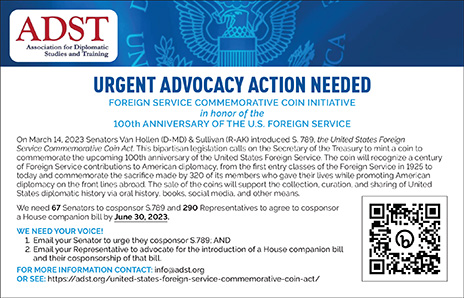Broadcasting Behind the (Opening) Iron Curtain
The era of open communication following the end of the Cold War has thrown up new, more complex challenges.
BY MARK G. POMAR
On Sept. 26, 1988, Valentin Falin, the chair of Novosti Press Agency, and Charles Z. Wick, director of the U.S. Information Agency (USIA), opened the U.S.-USSR Information Talks, a three-day conference in Moscow aimed at expanding free access to information and increasing the number of cultural activities, exchanges, and exhibits. Building on the success of the May-June 1988 Moscow Summit—when President Ronald Reagan and General Secretary Mikhail Gorbachev finalized the Intermediate-Range Nuclear Forces Treaty (INF)—the information talks brought together high-ranking Soviet officials and 67 U.S. government officials and private-sector leaders to begin a new era of communication between the United States and the Soviet Union.
The past 40 years have shown the importance and complexity of U.S.-Russian relations in the area of public diplomacy. After an initial burst of freedom of information, starting in the late 1980s, today’s Russia (along with other authoritarian regimes) has again reverted to dictatorial rule, anti-Western rhetoric, and disinformation campaigns.
A Shaky Start
Despite a general warming of U.S.-Soviet relations, reflected in the initial pleasantries exchanged by Falin and Wick, the plenary session of the U.S.-USSR Information Talks got off to a shaky start. In his opening remarks, Wick immediately raised the question of Soviet disinformation, stating that it should be deplored by everyone professing a belief in glasnost (openness) and reform. “Under new thinking,” Wick noted in a declassified memcon, “how could the Soviet side knowingly approve the dissemination of such patently false and misleading stories as the alleged invention of AIDS in a U.S. military laboratory, the alleged invention by the U.S. of an ethnic weapon, or the alleged U.S. responsibility for the Jonestown massacre? The continuation of patently false stories when facts are readily available poisons the relationship between our two countries, contributes to the enemy image, and robs leaders of the element of trust.”
Soviet disinformation campaigns were a serious point of contention between the U.S. and the USSR, and it was proper for Wick to raise the issue forcefully. As other U.S. officials chimed in with more examples of disinformation, a heated back-and-forth discussion ensued with Soviet officials vigorously denying the charges. But as the plenary session progressed, I began to see moments of honesty. (I was there as an executive of the Board for International Broadcasting.)
Leonid Dobrokhotov, head of the Propaganda Department of the Central Committee, admitted that Soviet scientists had long ago rejected the notion that the United States invented the AIDS virus. Vadim Perfiliev, deputy chief of the Information Department of the Ministry of Foreign Affairs, conceded that there were times his department had issued “incorrect information.” Those small concessions ensured that the session ended on a positive note and that both sides were able to draw up plans for another round of information talks.
Faced with an aggressive Stalin regime in the late 1940s, the U.S. undertook a comprehensive strategic review of the tools, methods, and institutions needed to successfully wage a Cold War.
The next day, Steve Forbes, chair of the Board for International Broadcasting; Bruce Porter, the board’s executive director; and I met with Valentin Falin to discuss the jamming of Radio Free Europe/Radio Liberty. A longtime Soviet official, who had served in the KGB and the Ministry of Foreign Affairs, Falin greeted us in a cold and perfunctory manner. There were no pleasantries to exchange, and he seemed visibly uncomfortable sitting down with three representatives of RFE/RL, acting as though he had been sent to deliver a message he did not agree with. His first words caught us by surprise. “We have noticed,” he said, taking a long pause, “a distinct improvement in the broadcasts of Radio Liberty.” What followed those important words was the usual litany of RL sins: unfair criticism of the Soviet role in Afghanistan, lack of respect for the democratization of Soviet society, and the encouragement of nationalism in the Soviet republics.
As I listened to Falin’s criticism, all standard Soviet fare, I felt he was simply going through the motions, reading from a list prepared by his staff. He knew the decision to stop jamming RL had already been made, and he was just the messenger. The world that he and his colleagues had strived to build was crumbling before his eyes. Radio Liberty—vilified for decades, emblematic of a non-communist Russia—was now being treated in Moscow with respect as an important international broadcaster. How awkward that meeting must have been for him, a lifelong party apparatchik and a diehard opponent of glasnost.
We dutifully noted his criticism, politely stood our ground regarding specific broadcasts, and reminded Falin that jamming was a violation of international law and contradicted the spirit of Gorbachev’s reforms. Falin did not respond, and the meeting ended abruptly. But as we walked out, we all had a sense of jubilation. Just by sitting down with us, Falin communicated that it was only a matter of time before jamming would cease. Knowing that the Soviet authorities had recently approved a VOA news bureau, we even wondered if RFE/RL would be able to open its bureau and hire freelance correspondents. It was at that moment that I began to believe that the USSR had indeed embarked on an unprecedented path of reform, and that no one, least of all senior Soviet officials, knew where it would lead.
A New Era
On Nov. 21, 1988, two months after our Moscow meeting, George Woodard, the director of engineering at RFE/RL, received a call that all jamming had suddenly stopped. “So unbelievable was this development,” Woodard reminisced, “that all I could think of was to keep listening—it must be a mistake. Throughout the night, into the next day, and the days following it was confirmed … RFE/RL programs were clear of jamming noise.”
The end of all Soviet jamming marked the beginning of a new era for U.S. broadcasting. Within several months, VOA and RFE/RL opened news bureaus and hired freelance correspondents in the Soviet Union. In addition to comprehensive news broadcasts, VOA introduced many new programs that explained the workings of a market economy, a free press, and a modern banking system. It also established “radio bridges” that brought Americans and Russians together to explore the challenges facing a reforming Soviet Union. Significantly, VOA was able to place many of its new programs on local Russian radio stations, thereby increasing its audience reach, and to establish training sessions for young Soviet journalists, helping them to acquire the skills needed for independent professional journalism.
A growing network of freelance journalists throughout the USSR allowed RL to report on local events and review the regional press, making those stories accessible to the entire country. New programs, such as “The Soviet Union and the Nationality Question,” “Baltic Journal,” and “Jewish Culture and Social Life,” included discussions with Western experts on how other societies coped with the complexities of a multiethnic population.
On the cultural front, RL introduced a new program, “Ex Libris,” which presented works by promising young writers. Among the more memorable broadcasts was an interview with an aspiring writer, Svetlana Alexievich, about her new book, Zinky Boys (W.W. Norton, 1992), a collection of firsthand accounts of the war in Afghanistan. The future Nobel laureate noted that the Soviet military tried to suppress her book, but RL gave her the opportunity to address her growing readership directly. Rounding out the slate of new initiatives was a lively program, “Broadway 1775” (the address of RL’s New York bureau), which communicated the dynamism of American life through interviews with Soviet visitors in the United States, reviews of the American press, and timely discussions of political and economic issues of interest to a Soviet audience.
The end of all Soviet jamming marked the beginning of a new era for U.S. broadcasting.
With the collapse of the Soviet Union in 1991, RFE/RL gained wide public recognition. Newly elected leaders, including Vaclav Havel, Tadeusz Mazowiecki, and Boris Yeltsin, praised the broadcasters for promoting human rights during the Cold War. On behalf of the leaders of Czechoslovakia, Hungary, Bulgaria, and Poland, Lennart Meri, foreign minister of Estonia (and later, president), nominated RFE/RL for the 1991 Nobel Peace Prize, citing its unique contribution to the rebirth of democracy. And in March 1993, Radio Liberty celebrated its 40th anniversary in Moscow with the who’s who of the Russian cultural and political elite, including Mikhail Gorbachev.
The euphoria at the end of the Cold War, however, signaled dangers for the broadcasters. Campaigning on a platform that promised a “peace dividend,” President Bill Clinton proposed to cut the VOA budget and zero out funding for RFE/RL. This radical move caused turmoil on Capitol Hill, especially as leaders in Eastern Europe weighed in, stating boldly that the broadcasts were fundamental to the development of democratic rule. One senator, Joe Biden, took up the cause of international broadcasting, became personally involved, and forged a bipartisan bill—the International Broadcasting Act of 1994—that consolidated all U.S. broadcasters under one Broadcasting Board of Governors. However imperfect that legislation, it saved RFE/RL.
Unlike broadcasting, which saw deep budget cuts, other elements of public diplomacy enjoyed dramatically increased funding. The U.S. Congress passed two major bills—Support for East European Democracy (SEED) Act (1989) and the Freedom Support Act (1992)—that provided the State Department, USIA, and other agencies with more than $1 billion to assist former communist countries in their transition to democracy. As those countries opened their borders, American NGOs, universities, and associations began to implement many different U.S. government programs, ranging from business training and study tours to the establishment of internet centers in rural libraries.
Of major significance were high school, undergraduate, and graduate programs offering tens of thousands of young people the opportunity to study in the U.S. and even earn American degrees. So expansive was this funding that USAID set up enterprise funds that invested hundreds of millions of dollars in small and medium-sized businesses with the purpose of teaching Western business practices.
Today’s Challenges
In time, many U.S.-funded programs wound down as East European countries joined the European Union and NATO. In Russia, they continued, albeit on a smaller scale, until 2012, when Putin adopted a harsh, anti-Western stance, accusing American organizations of “brainwashing Russians.” Two Russian laws targeting so-called “foreign agents” and “undesirable foreign organizations” led to the closure of U.S. programs. After the invasion of Ukraine in 2022, the Kremlin even formally abrogated the 1958 U.S.-Soviet Cultural Exchange Agreement that had been renewed annually and served as the basis for joint programming.
In a parallel move, the Kremlin unleashed a vitriolic campaign against international broadcasters, eventually forcing Radio Liberty to suspend its operations in Russia. Again, as in pre-glasnost times, VOA and RFE/RL became “external broadcasters.” They continue to produce outstanding programming, especially about the war in Ukraine, through their joint project, “Current Time,” but their access to Russia is limited.
In 2022, the Kremlin even formally abrogated the 1958 U.S.-Soviet Cultural Exchange Agreement that had been renewed annually and served as the basis for joint programming.
The challenges facing the United States today are more daunting than the ones facing us in the waning years of the Cold War. By the 1980s, communism was a lifeless ideology, the Soviet state inefficient, and the economy in stagnation. Most important, Soviet citizens were eager to learn about the West and become part of the modern world. They sought out foreign broadcasts, despite jamming; and when opportunities arose, they applied for grants to study in the West. Now, under Putin’s rule, Russia has turned inward, drawing on age-old xenophobia and nationalist imperialism. According to recent polls, a large majority of Russians have bought into Kremlin propaganda and adopted a virulently anti-Western stance.
Likely, we will need to confront a hostile Russia for years to come. But not just Russia. China, North Korea, Iran, and other authoritarian states are also engaged in aggressive disinformation campaigns that pose a direct threat to the United States. In addition, there are global news networks that are increasingly controlled by nonstate actors. After decades of peace and open communication, we are back to a highly dangerous and unpredictable world.
When faced with an aggressive Stalin regime in the late 1940s, the U.S. undertook a comprehensive strategic review of the tools, methods, and institutions needed to successfully wage a Cold War. That review resulted in a new national security structure and operations, including the creation of the U.S. Information Agency, Radio Free Europe/Radio Liberty, and a strengthened Voice of America with new Russian and Ukrainian language services. Those new institutions helped bring the Cold War to a peaceful end.
Today, the Biden administration should begin a similar strategic review by establishing a high-level bipartisan commission that would be charged with analyzing current U.S. capabilities in public diplomacy and international broadcasting and making specific recommendations about restructuring current institutions, creating new ones if needed, and setting funding levels. By drawing on a diverse set of experts from the private and government sectors, the Biden administration can revitalize U.S. foreign policy and effectively make the case to the American people that public diplomacy and international broadcasting are fundamental to our national security.
When sharing or linking to FSJ articles online, which we welcome and encourage, please be sure to cite the magazine (The Foreign Service Journal) and the month and year of publication. Please check the permissions page for further details.
Read More...
- “Using ‘Social Diplomacy’ to Reach Russians” by Robert Koenig, The Foreign Service Journal, January-February 2014
- “Communications Behind the Iron Curtain” by Timothy C. Lawson, The Foreign Service Journal, December 2016
- “Broadcasting Behind the Iron Curtain” book review by Eric Rubin, The Foreign Service Journal, September 2022
- “Lessons from ‘Cold War Radio’: A Conversation with Mark Pomar,” The Russia File Podcast, The Wilson Center







